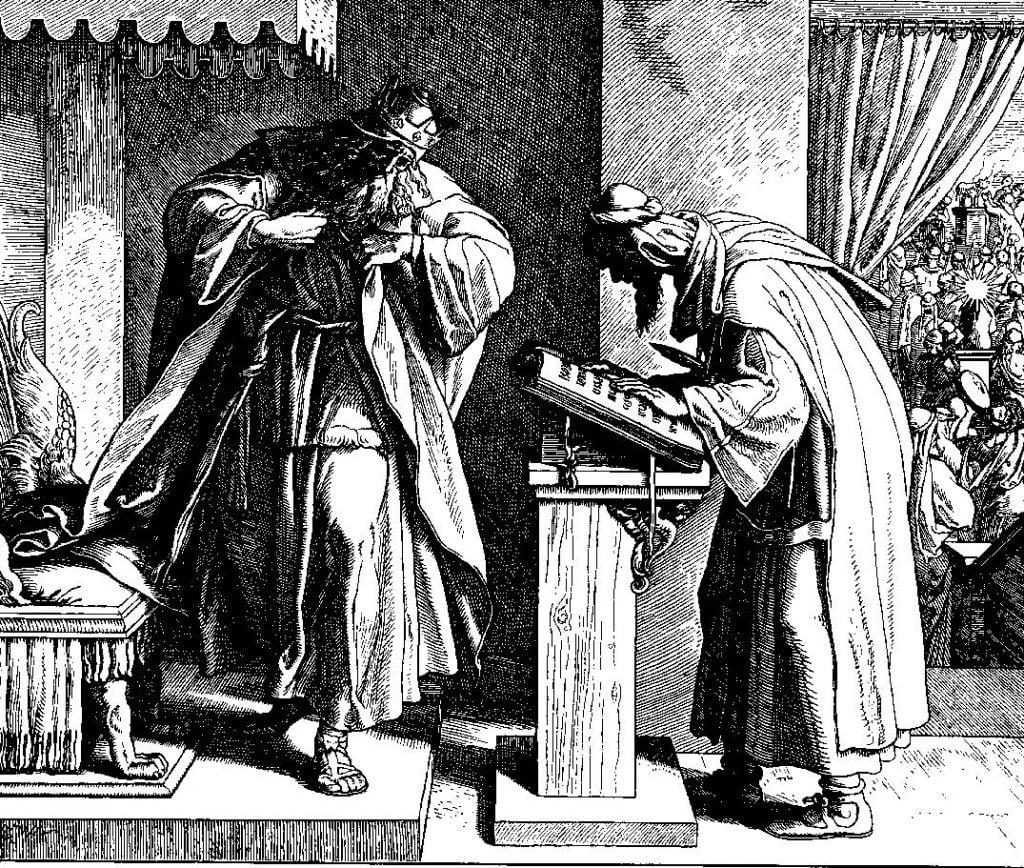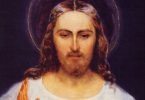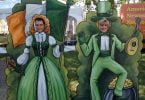
by Joe Bollig
I’ll never understand why some people think the Bible is one story after another of holy people doing good and godly things.
All you have to do is crack it open and see this is not the case. Take, for example, the Old Testament books of 1 and 2 Kings.
These two books could be combined and given a new title: “How to ruin your life, destroy your family and devastate your nation through pride, stubbornness, greed and lust for power.”
These two books are about the tragic division and decline of the Kingdom of David and the 12 Tribes of Israel. Ironically, the seeds of the great kingdom’s downfall were planted when the kingdom was at its zenith under both Kings David and Solomon.
Just after King Solomon finished his big building projects that included the Temple and the royal palace, the Lord appeared to him and made a two-part promise that essentially boiled down to this:
If the rulers and people of the kingdom keep my statutes and commandments, they will be secure. BUT, if they do not and follow pagan ways and worship pagan gods, they will experience ruin and desolation.
Despite God’s warning, King Solomon’s heart was turned by his pagan wives, and he built pagan temples and installed pagan priests to please them. Oh, yes, he still worshipped at the Temple. But he also worshipped the gods of his foreign wives, and “his heart was not entirely with the Lord,” and, “he did not follow [God] unreservedly” (1 Kings 11:4,6).
King Solomon also imposed heavy taxes on the people to pay for his grandiose projects and lavish lifestyle.
From there things just went downhill.
Jeroboam, a man of wealth and ability who worked for Solomon, led a rebellion that tore away 10 northern tribes that became the Northern Kingdom of Israel. The remaining two tribes became the Southern Kingdom of Judah.
Readers of 1 and 2 Kings have many face-palm moments as they read how, for 400 years, the kings of both Israel and Judah did stupid and evil things that were sure to get them in trouble with God and other folks.
For example, you would think that King Jeroboam would have learned a thing or two from the story of the golden calf in the Book of Exodus. But, no! This smart boy made TWO golden calves for his people to worship. That’s just begging for a divine beat-down.
The kings of the two kingdoms of Israel and Judah form a veritable rogues gallery.
Some are military commanders who launched coups against their kings, killing whole royal families as well as the king so they could gain the throne.
Several kings built pagan shrines, supported pagan priests and participated in pagan worship. Some kings even committed unspeakable acts of child sacrifice, such as Judah’s King Ahaz and King Manasseh.
Repeatedly, passages in 1 and 2 Kings note how one king after another imitated the evil of his father or “did evil in the sight of the Lord.” One of the worst was King Ahab of Israel, whose wife was the notorious Queen Jezebel. He “did more to anger the Lord, the God of Israel, than any of the kings of Israel before him” (1 Kings 16:33).
A few kings tried to launch reforms and “do things pleasing to the Lord,” such as Judah’s King Uzziah/Azariah and King Jotham. But most of the “reform” kings left the “high places” of pagan worship intact.
If there is one “hero king” among the royalty of 1 and 2 Kings, it’s King Josiah of Judah.
King Josiah’s rule had been foretold many years before, and he took the throne when he was only eight years old. As an adult, he “pleased the Lord and conducted himself unswervingly just as his ancestor David had done” (2 Kings 22:2).
If you read 2 Kings 22-23 carefully, you get an idea of just how bad things had gotten in terms of the Hebrew people’s knowledge of God’s revelation and faithfulness.
One day the high priest found the Book of the Law in the Temple, and gave it to a scribe, who read it and then recited it to King Josiah. Think about it. The Chosen People had misplaced the Pentateuch and forgotten about it, and God’s revelation it contained.
What was the king’s reaction?
“When the king had heard the contents of the book of the law, he tore his garments,” and said, “Go consult the Lord for me, for the people, for all Judah, about the stipulations of this book that has been found. . . .” (2 Kings 22: 11).
The king had an amazing conversion of heart and mind, and he launched a far-reaching religious reform movement. He ended cultic prostitution. He tore down every single pagan idol, altar, shrine, high place and pole. He burned them and even “pulverized” them, “breaking up the stones, grinding them to powder, and burning the Asherah” (2 Kings 22:15). He did away with the consultation of ghosts and spirits, and with household gods and idols.
And that’s not all. He reintroduced the heretofore abandoned practice of keeping the Passover of the Lord.
“No Passover such as this had been observed during the period when the Judges ruled Israel, or during the entire period of the kings of Israel and the kings of Judah, until the eighteenth year of King Josiah when this Passover of the Lord was kept in Jerusalem” ( 2 Kings 23:22-23).
Sad to say, most of the kings of Judah and Israel after King Josiah “did evil in the sight of the Lord,” and the people returned to pagan worship.
As a consequence, Israel was conquered by Assyria and the 10 Tribes were carried away — and disappeared in the maelstrom of history. Later, the Kingdom of Judah was conquered by the Babylonians and the people were carried away.
And what followed that is another story.







I find that kings to the calender plays into many daily works .that show david sam 24 robe cut as year sam 2019 or he had cut into ever or a overplay of his days pknuckle sit work .as his seat was perhaps dirty before he wasnt sat in it .with tones of say kings ten 20 is the six steps a non pknuckle player makes to the fridge while a player is counting to take a ten as a trick to win a close fit .i loved watching david of showdown at abilene movie be of say sept 18 or that weak at kings to the calender .to maybe david prowse playing darth vader as they share a hand at the game .maybe at ever .or as tomorrow be .that may your seat be empty and so on .